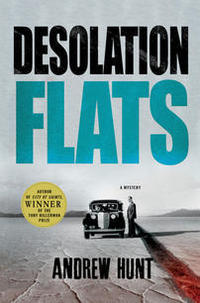Desolation Flats by Andrew Hunt
 Wednesday, December 28, 2016 at 9:01AM
Wednesday, December 28, 2016 at 9:01AM 
Published by St. Martin's Press/Minotaur Books on November 15, 2016
Desolation Flats takes place in the late 1930s. The Ovesons are Mormons. Art Oveson is a police detective in the sleepy Salt Lake City Police Department. Art’s wife Clara suffers from depression that was triggered, or at least worsened, when the church encouraged her to quit her job so she could raise her three children. She is at war with her daughter, Sarah Jane, who has rebelled against the church. Art would like to take Clara on a cruise to snap her out of her doldrums but he can’t afford it. All of that background comes early in the novel but Clara and Sarah Jane never become significant characters. Perhaps they play a larger role in the first two novels of the series, neither of which I’ve read.
In any event, family drama quickly fades into the background as the crime drama takes center stage. An additional bit of family drama emerges, however, as Art’s brother, an ambitious FBI agent, confronts Art in an accurate illustration of the politics of crime.
The story opens with Art saving the life of Clive Underhill, a wealthy and famous Englishman who lost control of his racecar on the salt flats. Clive’s racing team is competing with a German team to develop the world’s fastest car. Back in England, Clive received death threats after he disassociated himself from the fascist cause.
Art’s beat is missing persons, but when Clive goes missing, Art also becomes involved in a related murder investigation. The primary suspect is Art’s best friend, a former police detective who is now a private detective. Investigating for the FBI is Art’s brother.
All of that makes for an interesting and unusual setting, something I always like to see given the relative sameness of so many crime stories. Being a good Mormon, Art loves his ice cream but doesn’t drink liquor. He also resists a sexual advance from (of all people) Leni Riefenstahl. Art’s moral strength make him kind of a dull character, but the book itself isn’t dull, so that can be forgiven.
Also interesting is the intersection of pro-fascists (some from Germany, some from Utah) with homebred organizations that have infiltrated the Salt Lake City Police, preaching hatred of blacks, Mexicans, Jews, and pretty much everyone else who might be a threat to racial purity or narrow-minded thought. In that regard, Desolation Flats is a timely reminder of the past (just when you think things have changed, it seems they haven’t changed all that much).
The mystery that ties together Clive’s disappearance and various deaths kept me guessing about which of the potential suspects were actually involved and in what capacity. Near the end of the story, however, Art overhears a conversation in which two people tell each other things they already know. That helps Art and the reader piece together a solution to the mystery, but the conversation is so forced that it just isn’t credible. That’s my strongest gripe about a novel that in most other respects is well crafted, but it’s a significant gripe. I liked the story and the setting enough to recommend the novel despite an ending that I can only rate as disappointing.
RECOMMENDED
Reader Comments